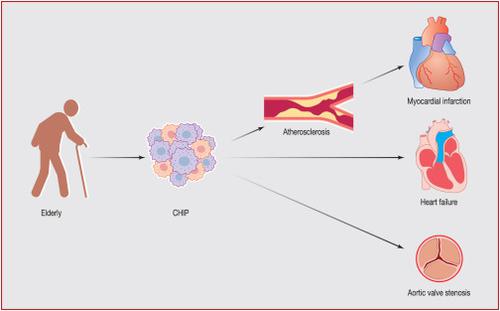Archives of Cardiovascular Diseases ( IF 2.3 ) Pub Date : 2021-03-10 , DOI: 10.1016/j.acvd.2021.01.002 Sami Fawaz , Olivier Mansier , Yann Pucheu , Séverine Marti , Harmony Leroy , Astrid Gaufroy , Jean Broitman , Chloe James , Thierry Couffinhal

|
Cardiovascular diseases, particularly atherothrombosis, are the leading cause of death worldwide, but their mechanisms are not yet fully understood. Traditional cardiovascular risk factors have been known for many years, but are not enough to predict individual risk. Clonal haematopoiesis of indeterminate potential (CHIP) has been described recently; it corresponds to the clonal expansion of a population of haematopoietic cells in response to the acquisition of a somatic mutation, without any clinical or biological sign of haematological malignancy. The prevalence of this condition increases with age, reaching 10–20% of the general population aged > 70 years. Recent observational studies have shown a link between CHIP and cardiovascular diseases in humans, revealing that CHIP carriers have a higher risk of myocardial infarction, heart failure and severe aortic valve stenosis. The prognosis of these conditions also seems to be altered by the presence of CHIP. Experimental studies have identified that the immune system and inflammation – particularly interleukin-1β-secreting macrophages – play a critical role in enhancing the cardiovascular consequences of CHIP, through their action on the atherosclerotic plaque and myocardial tissues. We aimed to write an extensive review of what is currently known about CHIP and its cardiovascular consequences, the pathophysiological mechanisms leading to the increased cardiovascular risk and, finally, the expected influence on our daily practice and how we care for patients with CHIP.
中文翻译:

克隆性造血与心血管疾病:日益增长的关系
心血管疾病,特别是动脉粥样硬化血栓形成,是全世界范围内主要的死亡原因,但其机理尚未完全明了。传统的心血管危险因素已为人所知多年,但不足以预测个人危险因素。最近已经描述了不确定电位的克隆性造血功能(CHIP)。它对应于由于获得体细胞突变而引起的造血细胞群的克隆扩增,而没有任何临床或生物学上的血液学恶性迹象。这种疾病的患病率随着年龄的增长而增加,达到年龄 >的总人口的10–20% 70年了 最近的观察性研究表明,CHIP与人类心血管疾病之间存在联系,表明CHIP携带者发生心肌梗塞,心力衰竭和严重主动脉瓣狭窄的风险更高。CHIP的存在似乎也改变了这些疾病的预后。实验研究表明,免疫系统和炎症-特别是分泌白介素1β的巨噬细胞-通过发挥其对动脉粥样硬化斑块和心肌组织的作用,在增强CHIP的心血管后果中起关键作用。我们的目的是就CHIP及其心血管后果,导致心血管疾病风险增加的病理生理机制,以及最后,











































 京公网安备 11010802027423号
京公网安备 11010802027423号